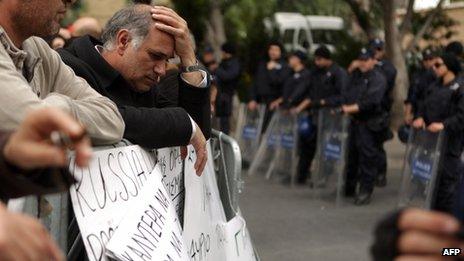Cyprus crisis: What happens next?
- Published

Cyprus, one of the smallest members of the European Union, has become the latest high-profile casualty of the long-running eurozone crisis.
A bailout deal worth 10bn euros ($13bn; £8.5bn) was agreed with the EU and the International Monetary Fund (IMF) last week. But since then the Cypriot parliament has rejected the proposal of a one-off levy on people's bank savings.
Cypriot authorities are now in a race against time to agree an alternative plan that will raise the 5.8bn euros it needs to unlock the bailout funds before a Monday deadline set by the European Central Bank (ECB).
So what happens next?
Scenario 1 - Cyprus leaves the euro
Perhaps the worst-case scenario is that a bailout deal is not agreed by Monday, and the ECB cuts emergency funding to Cyprus's two biggest banks, as it has threatened to do.
That would probably cause the Cypriot banking system to collapse, leading to the effective bankruptcy of Cyprus's government, and possibly its exit from the euro.
There is no official mechanism by which euro members can leave the single currency.
But if the banks are allowed to collapse, Cyprus will be left without a functioning banking system, no willing creditors and an economy in crisis.
The ECB's move would leave the government with little choice but to exit the euro so that it could begin printing its own money in order to provide the banking system with liquidity.
Leaving the euro would also allow it to devalue its currency to help exporters, further boosting the economy.
What impact that would have on the wider eurozone is unclear. The risk of direct contagion to other economies is small, as European banks are not heavily invested in Cyprus's relatively small economy.
But more widely, the exit could cause a loss of confidence in the eurozone project. Investors may consider withdrawing from Greece and other struggling euro members now that a euro exit is perceived as a real possibility.
Equally, if Cyprus recovers quickly from its current crisis outside the euro, other members may question the value of eurozone membership.
Scenario 2 - Cyprus agrees a revised deal
Cyprus's politicians are still trying to hammer out an agreement through which they can raise the 5.8bn euros demanded by the EU and IMF.
With the initial plan to impose a levy on all bank deposits rejected by parliament, a number of alternatives have been suggested.
They have included:
- A state fund scraping together state assets and donations from the church
- Nationalisation of pension funds
- Large-scale restructuring of the banking sector, including dividing Laiki Bank - the second largest - into a "good bank" and a "bad bank"
- Russian investment in Cyprus's emerging natural gas industry, or an extension to a 2.5bn euro Russian loan.
On Friday, Cypriot President Nicos Anastasiades again held talks with the EU and the IMF, while the Cypriot parliament was still waiting to vote on the latest proposals.
But hopes that Russia could come to the rescue appear to have faded: Cyprus's finance minister returned from talks in Moscow on Friday empty-handed.
Even if the 5.8bn euros are raised and the bailout package secured, the outlook for Cyprus is bleak.
The bailout will come with austerity requirements. Confidence in the banking sector has been knocked and there may yet be a run on Cyprus's banks should their doors eventually re-open.
Scenario 3 - Bring back the levy
It was the planned levy on bank deposits that provoked the most anger among MPs and the Cypriot public when the initial bailout deal was agreed a week ago.
But unless the government can find another way of raising that money, they may have to stick with it - but perhaps in a revised form that charges those with the biggest deposits the most, while protecting smaller savers.
That would be likely to hurt Russian customers the most. They are believed to hold 20bn euros of deposits in Cypriot banks.
European creditor countries such as Germany would support this as they are feeling political pressure to reduce the amount they spend bailing out their southern European neighbours.
This may also have a wide impact on the eurozone, however. Some analysts have warned that the measure would set a dangerous precedent in the world of eurozone bailouts.
In previous rescues, individual accounts have been protected and governments, private investors and banks have picked up the tab. Bank customers in other European countries may begin to fear that their savings will also be targeted should their economies run into trouble in the future.
The unpopularity of the bank levy may also increase public pressure on the Cypriot government should they pass this measure, which would make it difficult to pass the austerity measures that are also required by the bailout deal.
Scenario 4 - A bigger EU bailout
The EU has so far played tough with Cyprus, demanding a deal by Monday and reacting coolly to some of the proposals so far.
But if the EU feels the game of brinkmanship is failing to generate a solution to the Cyprus crisis, it could offer a more generous bailout package, meaning that less money needs to be raised domestically.
Authorities may be amenable to this as the bank levy proposal is being increasingly seen as a policy mistake, and the threat of a euro exit too great a concern.
The Cyprus bailout is also relatively small (10bn euros) compared with Greece's two bailouts, for example, which totalled 240bn euros.
Either way, Cyprus faces a difficult economic time ahead, and time is running out to prevent the country's disastrous economic collapse.